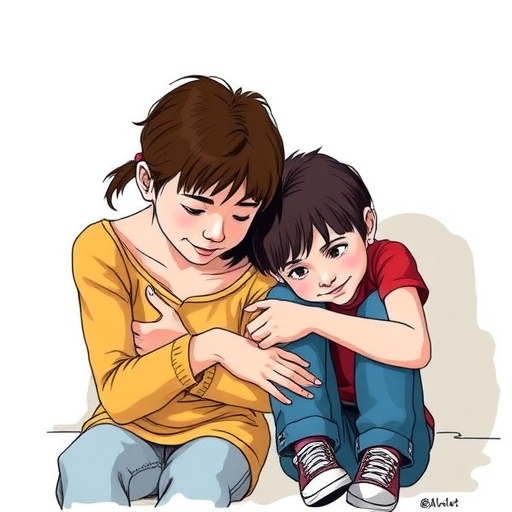The increasing prevalence of Non-Suicidal Self-Injury (NSSI) among adolescents has emerged as a concerning mental health trend worldwide, spurring extensive research into its underlying causes and potential interventions. A recent pivotal study published in BMC Psychiatry delves into the intricate relationship between parenting styles and the coping mechanisms adopted by adolescents with and without NSSI behaviours. This groundbreaking comparative analysis bridges a critical knowledge gap by highlighting how differing parental approaches can significantly influence emotional regulation and problem-solving strategies during this vulnerable developmental stage.
Central to this investigation is the recognition that adolescence is a period marked by heightened emotional volatility and identity formation, rendering coping mechanisms an essential determinant of psychological resilience. The research team, led by Wang, Chen, and Hu, conducted a meticulous cross-sectional study involving 622 adolescents aged 11 to 18 from both clinical and community settings in Ningbo, China. This sample included 311 adolescents diagnosed with NSSI and an equal-sized control group free of such behaviours, enabling a robust comparative framework to dissect the psychosocial variables at play.
The comprehensive dataset integrated detailed parental and family background information with validated psychometric assessments to map specific parenting styles—encompassing dimensions such as affection, control, and preference—and their correlation with adolescent coping schemas. The methodological arsenal employed statistical tools ranging from chi-square tests to stepwise regression analyses, ensuring that nuanced interrelations were captured with empirical rigor. This approach underscored the dynamic interplay between familial environmental factors and the adolescents’ adaptive or maladaptive coping responses.
One of the salient revelations of the study is the pronounced link between family discord and the incidence of NSSI behaviours. Adolescents from families characterized by disharmony exhibited markedly higher tendencies toward self-injurious actions, suggesting that emotional instability within the domestic setting acts as a potent risk factor. Moreover, parental education level emerged as a significant variable, with lower parental educational attainment correlating with increased NSSI risk, potentially reflecting broader socio-economic stressors and attitudinal differences toward mental health awareness.
A particularly novel finding lies in the differentiated impact of maternal behaviours across the NSSI and non-NSSI groups. In adolescents without self-injurious tendencies, an excessive maternal preference, although well-intentioned, was inversely related to their problem-solving capacities, possibly by fostering dependency or diminishing autonomy. Conversely, in the NSSI cohort, exposure to negative parenting styles—characterized by harshness, rejection, or lack of emotional support—showed strong associations with coping strategies centered around emotional avoidance or rumination. These emotional-oriented coping mechanisms may perpetuate mental distress, exacerbating self-injurious tendencies.
The researchers emphasize that these differential patterns illuminate critical pathways through which parenting styles can either buffer against or contribute to maladaptive adolescent behaviours. This underscores the necessity for targeted family-centered psychological interventions, which focus specifically on enhancing parental understanding, emotional attunement, and positive reinforcement to nurture healthier coping frameworks within at-risk youth populations.
From a clinical perspective, the study’s insights advocate for the integration of psychoeducational programs that equip parents with the skills to foster secure attachment and constructive emotional communication. By mitigating the negative impacts of dysfunctional parental practices, such programs can disrupt the cycle of emotional dysregulation, offering adolescents more effective tools to navigate stress and interpersonal conflicts. This is especially pertinent given that adolescence is a critical window for the prevention of escalatory patterns that may culminate in more severe psychiatric disorders or suicide risk.
Furthermore, the research delineates the heterogeneity inherent in adolescent psychological responses, emphasizing that uniform interventions may fall short unless individualized coping profiles and familial contexts are considered. This precision-oriented approach aligns with emerging paradigms in mental health care, advocating for customization based on psychosocial and environmental determinants rather than a one-size-fits-all solution.
The broader societal implications of this study reverberate beyond the clinical realm, highlighting the pivotal role of parental education and community awareness in curbing the tide of adolescent NSSI. Enhancing public health strategies to promote positive parenting, alongside school-based mental health literacy initiatives, could create a more supportive ecosystem that fosters resilience among vulnerable youth.
In synthesizing these findings, Wang and colleagues contribute a critical piece to the complex puzzle of adolescent mental health, elucidating how nuanced parenting behaviours sculpt coping strategies that either predispose to or protect against NSSI. Their work advocates for a paradigm shift in preventative mental health care, emphasizing the symbiotic nature of family dynamics and individual psychological adaptation.
As NSSI rates continue to climb globally, the urgency of such research cannot be overstated. Future longitudinal studies and multi-centre trials inspired by this work could further unravel causal mechanisms and inform scalable interventions. Until then, the imperative of cultivating nurturing family environments as a frontline defence against adolescent self-injury remains clear.
This study not only deepens our understanding of the psychosocial substrates of NSSI but also serves as a clarion call for integrated multi-level efforts spanning families, schools, healthcare providers, and policymakers dedicated to safeguarding adolescent well-being in an increasingly complex world.
Subject of Research: The impact of parenting styles on coping strategies among adolescents, with a comparative focus on those exhibiting non-suicidal self-injury (NSSI) and those who do not.
Article Title: Parenting styles and adolescent coping methods: a comparative study of non-suicidal self-injury and distinct groups.
Article References:
Wang, B., Chen, L., Hu, C. et al. Parenting styles and adolescent coping methods: a comparative study of non-suicidal self-injury and distinct groups. BMC Psychiatry 25, 611 (2025). https://doi.org/10.1186/s12888-025-07042-5
Image Credits: AI Generated




